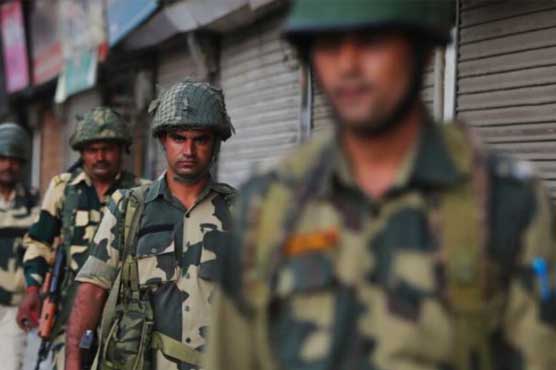Six things to know about occupied Kashmir's changed status

Article 370 which came into effect in 1949, exempted Jammu and Kashmir state from India.
NEW DELHI (Web Desk/AFP) - Amid escalating tension in occupied Kashmir following deployment of tens of thousands of additional troops, the Indian government has ended special status of the valley while scrapping articles 35A and 370 of the Constitution.
Here are six things to know about the unprecedented move:
What is Article 370?
The article, which came into effect in 1949, exempted Jammu and Kashmir state from the Indian constitution. The provision gave Kashmir’s assembly the power to vet national laws passed by New Delhi. It also gave the state a separate constitution and a flag.
Under the provision, Indians outside the state were blocked from permanently settling, buying land, holding local government jobs and securing education scholarships.
Under the changed status, the region will now be governed by the laws applicable to other Indian citizens.
What is Article 35A?
Article 35A was introduced through a presidential order in 1954 to continue the old provisions of the territory regulations under Article 370 of the Indian constitution.
The article permits the local legislature in Indian-occupied Kashmir to define permanent residents of the region.
It forbids outsiders from permanently settling, buying land, holding local government jobs or winning education scholarships in the region.
The article, referred to as the Permanent Residents Law, also bars female residents of Jammu and Kashmir from property rights in the event that they marry a person from outside the state. The provision also extends to such women’s children.
Why now?
The Hindu nationalist government of Prime Minister Narendra Modi enjoys a sizeable majority in parliament after dominating the polls in the April-May elections.
Modi’s right-wing Bharatiya Janata Party (BJP) can now push through parliament its key policy goals. This includes the BJP’s long-held promise to scrap Article 370.
Critics say the BJP’s latest move is a part of its agenda to please core supporters and win more votes by stoking Hindu nationalist fervour.
The move is in line with its approach towards Kashmir and Pakistan, which also claims the former Himalayan kingdom.
Significance
The special status, which has been in place since May 14, 1954, has helped Kashmiri Muslims and other communities preserve their strong sense of culture.
The ditching of the status has highlighted long-running fears that the local way of life and customs could be lost amid migration from other parts of the country.
Analysts say the Indian government wants to change the region’s demographics by allowing non-Kashmiris, mostly Hindus, to buy land and settle there permanently.
It is also likely to worsen the simmering and bloody rebellion in Kashmir, where an insurgency over the past three decades has left more than 70,000 dead, mainly civilians.
International ramifications
The decision has a direct impact on relations between nuclear rivals India and Pakistan. Kashmir has been divided between the neighboring countries since 1947 and they have fought two out of three wars over the region.
In February the countries were on the brink of war after India launched air raids on Pakistan over a deadly bombing in Kashmir that killed 40 paramilitary troops.
Pakistan launched counter air strikes with the retaliations, capturing Indian Wing Commander Abhinandan Varthaman.
The move could also affect the United States’ move to exit Afghanistan after an 18-year war, launched following the 2001 terror attacks.
Pakistan has been a key facilitator in direct talks between Washington and the Taliban in Afghanistan over the exit plans.
US President Donald Trump recently offered to mediate between India and Pakistan over Kashmir, but New Delhi has long insisted the issue can only be resolved bilaterally.
What’s next?
Up next is a bill proposing splitting the state of Jammu and Kashmir into two union territories -- Jammu and Kashmir division, and Ladakh.
This means the entire region would lose its autonomous status and come under the direct rule of New Delhi.
The Jammu and Kashmir division will have its own assembly and elections but the national government will have control of local laws, including the maintenance of public order.
The tinderbox region was placed under a massive security lockdown and communications were cut ahead of Monday’s announcement, on fears it would trigger fresh unrest.

